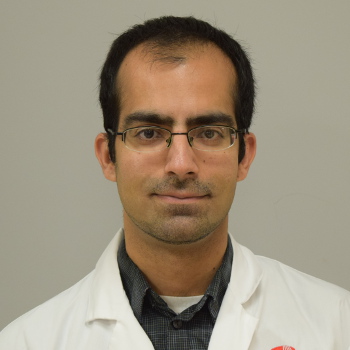Jawaad Sheriff, Ph.D.
Research Assistant Professor
Research Focus
 My research goals are two-fold: (1) investigate the role of patient age in clot formation
risk under flow conditions, and (2) develop a lab-on-a-chip platform to diagnose clotting
risk and elucidate therapeutic approaches for mechanical circulatory support (MCS)
device recipients.
My research goals are two-fold: (1) investigate the role of patient age in clot formation
risk under flow conditions, and (2) develop a lab-on-a-chip platform to diagnose clotting
risk and elucidate therapeutic approaches for mechanical circulatory support (MCS)
device recipients.
Blood platelets are known to activate and increase the risk of clot formation under
pathologic flow shear stresses, but the role of subject age in such phenomena is unknown.
Most in vitro studies examining the role of flow shear stress on platelets have utilized blood
from healthy young or middle-aged adults. Platelets from newborns are characterized
by hyporeactivity when treated with biochemical agonists, but an understanding of
their behavior under physiologic and pathologic flow conditions is incomplete. In
addition, behavior of platelets from elderly subjects is poorly investigated. My research
aims to paint a clearer picture of the role subject age plays in platelet activation
by utilizing blood from umbilical cords, healthy young and middle-aged adults, as
well as elderly subjects. This approach uses an arsenal of experimental tools (chromogenic
assays, flow cytometry, scanning electron microscopy, differential contrast microscopy,
and flow through microchannels) to investigate an array of biomarkers and morphological
parameters.
MCS devices provide vital support for heart failure patients, many who may not be
eligible for a heart transplant. However, these devices are characterized by dynamic,
high shear blood flow conditions which chronically activate platelets, increase clotting
risk, and require life-long antiplatelet and anticoagulation therapy. Selection of
the appropriate pharmacologic therapy is difficult and may lead to further complications,
such as bleeding. This is partly due to heterogeneous antiplatelet effectiveness under
flow conditions. My research seeks to develop a lab-on-a-chip construct that mimics
MCS-device associated flow conditions and evaluate the subject’s platelet activation
using minimal blood volume. Computational fluid dynamics is employed to optimize microchannel
design and function, while embedded biomarkers are used to evaluate platelet response.
The long-term goal of this microfluidic platform is to enable the clinician to accurately
evaluate platelet function and manage pharmacotherapy in patients with MCS devices.
Education
- Ph.D., Biomedical Engineering, Stony Brook University, 2010.
- M.S., Biomedical Engineering, Stony Brook University, 2007.
- B.S., Mechanical Engineering, University at Buffalo, 2005.
Academic Appointments
2016 – present: Research Assistant Professor, Department of Biomedical Engineering, Stony Brook University
Publications
Click here to view Jawaad Sheriff’s PubMed listings
